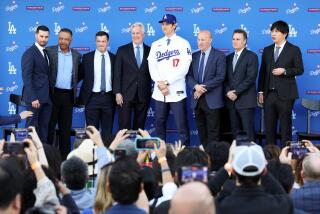Japanese firm Otsuka to buy Avanir Pharmaceuticals for $3.5 billion
- Share via
NEW YORK — The merger wave sweeping the healthcare business caught up another Southern California company Tuesday as Avanir Pharmaceuticals Inc. in Aliso Viejo agreed to be acquired for about $3.5 billion in cash.
Japanese drug giant Otsuka Pharmaceutical Co., maker of the popular drug Abilify, will pay $17 a share, a 13% premium over Avanir’s closing price Monday. Avanir shares jumped on the announcement and ended the day at $16.93, up $1.93, or 12.8%.
The proposed merger would combine Otsuka’s expertise in treating mental illness with Avanir’s drugs dealing with neurological disorders.
Otsuka’s Abilify is used to treat depression, bipolar disorder and other conditions. The company, a unit of Otsuka Holdings Co., is focused primarily on the fields of oncology and the central nervous system.
Avanir’s main product is Nuedexta, approved to treat a neurological disorder known as pseudobulbar affect that causes sudden outbursts of crying or laughing in about 2 million people. Avanir’s pipeline includes drugs to treat Alzheimer’s and Parkinson’s diseases, treatment-resistant depression and migraines.
Under terms of the deal, Avanir will operate as an independent unit of Otsuka’s American subsidiary.
In a regulatory filing, Avanir said that it does not anticipate any changes in employee head count or cash compensation targets and that the deal would mean “business as usual” for the company. “Goal is not to change how we operate!” the filing said.
The company said the deal would bring increased investment in its drug research and “increased leverage with wholesalers, managed care companies and other customers.”
The Avanir deal comes on the heels of the much larger acquisition of Botox maker Allergan Inc. in Irvine last month by Irish drug maker Actavis for about $66 billion.
The healthcare sector this year has rung up merger-and-acquisition deals totaling more than $440 billion, 13% of all such transactions so far on Wall Street, according to banking research firm Dealogic. The total value of all M&A activity tops $3.2 trillion, the most since the financial crisis of 2008 and one of the biggest deal years on record.
The Actavis deal is among the largest in any sector this year. Other large healthcare deals include Actavis’ $28-billion agreement in February to buy rival Forest Laboratories Inc. of New York and Minneapolis medical device maker Medtronic Inc.’s $47-billion deal for Ireland’s Covidien in June.
Last year, Amgen Inc. in Thousand Oaks bought Onyx Pharmaceuticals Inc. of San Francisco for more than $10 billion, gaining access to its blood cancer drug Kyprolis.
Although the general deal wave is being pushed mostly by low interest rates, analysts said health-related mergers also are driven, in part, by the Affordable Care Act as providers seek more clout for negotiations with increasingly cost-conscious insurers.
“The healthcare ecosystem is undergoing a significant amount of change,” said Bill Shew, a principal specializing in pharmaceuticals, biotech and medical-device firms at KPMG’s Strategy Group.
Obamacare has been spurring the general industry shift away from fee-for-service medicine to so-called value-based pricing, which sets prices primarily based on the value of the product or service as opposed to its cost.
Shew said the new emphasis has prompted insurers to increase pressure on healthcare providers on prices, which has prompted providers to combine to gain negotiating leverage.
The federal law also has raised the need to invest in information technology, providing another impetus to bulk up. What’s more, even with a few big players, healthcare remains relatively fragmented compared with other major sectors such as telecom and finance, making it ripe for consolidation.
Pharmaceutical companies are facing unique pressures to combine as they search for new revenue sources to offset the effects of expiring drug patents and faltering internal research-and-development pipelines.
“As they struggle with growth, they’re turning more and more to external sources of innovation, often smaller biotech companies,” Shew said.
Even though drug prices are quickly rising, Shew said, pharmaceutical companies are facing increasing resistance on price increases and the rest of the healthcare sector is struggling with declining profit margins.
The deals are expected to continue. A KPMG survey of mergers-and-acquisitions professionals found that about a third of them expected the pharmaceuticals-biotechnology field to be the most active industry for mergers next year, and a quarter cited hospitals and healthcare providers as most ripe for consolidation.
The leading factors cited as driving healthcare consolidation into next year were large cash reserves among companies in the sector, the expected continued availability of cheap credit and companies’ desire to build their intellectual property and enter new business lines.
More to Read
Inside the business of entertainment
The Wide Shot brings you news, analysis and insights on everything from streaming wars to production — and what it all means for the future.
You may occasionally receive promotional content from the Los Angeles Times.











